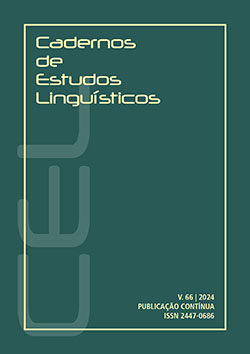Abstract
Since the 1980s, in Brazil, we have witnessed an exponential growth in the popularity of rap and, with it, a rupture, in the aesthetic discourse, between an objectified and passive peripheral subject and another, angry and demanding, typical of the periphery of the big cities. This growth has produced some sub-specifications of this musical genre, among which we highlight, in this article, cypher, a subgenre of rap in which a group of rhymers sing, completing each other's rhymes in sequence. We understand by peripheral subject, in cypher, the position signified by the inhabitant of the outskirts of large cities, today marked by their own forms of expression that stand out in relation to classic Brazilian literature. This difference does not only occur in relation to more distant works such as Dom Casmurro (1899), Os sertões (1902) or Vidas secas (1938), but also in more recent publications such as Quarto de despejo (1960), by Carolina Maria de Jesus. To a certain extent, the cypher materializes a “rhetoric of the periphery” in which the subject, paraphrasing Courtine (2015), expresses his anger. In this sense, this article proposes an analysis of the aesthetic discourse in the materiality of the Favela Vive cypher. In total, four songs constitute our corpus. We mobilize the concept of interdiscourse to think about how the peripheral subject is constituted based on the intricate relationship between military, political-economic, religious, and pedagogical discourses.
References
BRASIL. Ministério da Educação. Base Nacional Comum Curricular. Brasília, 2018.
COURTINE, Jean-Jacques. A voz do povo – a fala pública, a multidão e as emoções na aurora das massas. Tradução de Denise Leppos et. al. In: COURTINE, Jean-Jacques & PIOVEZANI, Carlos. História da fala pública: uma arqueologia dos poderes do discurso. Petrópolis, RJ: Vozes, 2015. pp. 261-289.
COURTINE, Jean-Jacques. Análise do discurso político: o discurso comunista endereçado aos cristãos. São Carlos: EdUFScar, 2009.
COURTINE, Jean-Jacques. Déchiffrer le corps: penser avec Foucault. Grenoble: Jérôme Million, 2011.
DE JESUS, Carolina Maria. Quarto de Despejo. São Paulo: Editora Ática, 1963.
FAVELA VIVE I. Direção: Guilherme Bhrem. Produção musical: Índio. Edição: GB LAB. Ano de lançamento: 2016. Disponível em: . Último acesso em: 27 de ago. 2022.
FAVELA VIVE II. Direção: Guilherme Bhrem. Produção executiva: Thomaz García. Edição: GB LAB. Ano de lançamento: 2016. Disponível em: . Último acesso em: 27 de ago. 2022.
FAVELA VIVE III. Direção: Guilherme Bhrem. Produção musical: Índio e Mortão. Produção executiva: Thomaz García. Edição: GB LAB. Ano de lançamento. 2018. Disponível em: <https://www.youtube.com/watch?v=avbOUVHr0QI>. Último acesso em: 27 de ago. 2022.
FAVELA VIVE IV. Direção: Guilherme Bhrem. Produção musical: Índio e Tibery. Produção executiva: Thomaz García. Edição: GB LAB. Ano de lançamento: 2020. Disponível em: <https://www.youtube.com/watch?v=SZ1H5lIOIuU>. Último acesso em: 27 de ago. 2022.
FOUCAULT, Michel. A arqueologia do saber. 7.ed. Tradução de Luiz Felipe Baeta Neves. Rio de Janeiro: Forense Universitária, 2004.
GREGOLIN, Maria do Rosário. Foucault e Pêcheux na Análise do Discurso: diálogos e duelos. 3.ed. São Carlos/SP: Claraluz, 2007.
JAEGER, Werner. Paideia: a formação do homem grego. Tradução de Artur M. Parreira. 6.ed. São Paulo: Martins Fontes, 2013.
ORLANDI, Eni. Análise de Discurso: princípios e procedimentos. 13ªed. Campinas, SP: Pontes Editoriais, 2020.
ORLANDI, Eni. Terra à vista: discurso do confronto: velho e novo mundo. São Paulo: Cortez, 1990.
PÊCHEUX, Michel. Semântica e discurso: uma crítica à afirmação do óbvio. Tradução de Eni P. Orlandi. 2. ed. Campinas: Editora da Unicamp, 1997.
RACIONAIS MCs. Sobrevivendo no inferno. São Paulo: Companhia das Letras. 2018.
SANCHEZ, Marco. Literatura marginal brasileira ultrapassa fronteira das periferias. DW. 27 de maio de 2013. Disponível em: https://www.dw.com/pt-br/literatura-marginal-brasileira-ultrapassa-fronteira-das-periferias/a-16835249 Acesso em 16 de maio de 2023.
VEYNE, Paul. Foucault: seu pensamento, sua pessoa. Tradução de Marcelo Jacques de Morais. Rio de Janeiro: Civilização Brasileira, 2011.

This work is licensed under a Creative Commons Attribution-NonCommercial 4.0 International License.
Copyright (c) 2024 Cadernos de Estudos Linguísticos


